五年级下册英语知识点
五年级下册英语知识点归纳整理总结
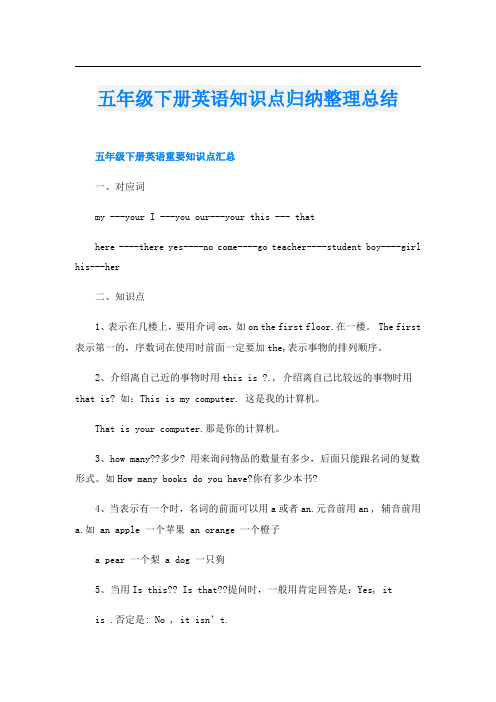
五年级下册英语知识点归纳整理总结五年级下册英语重要知识点汇总一、对应词my ---your I ---you our---your this --- thathere ----there yes----no come----go teacher----student boy----girl his---her二、知识点1、表示在几楼上,要用介词on,如on the first floor.在一楼。
The first 表示第一的,序数词在使用时前面一定要加the,表示事物的排列顺序。
2、介绍离自己近的事物时用this is ?., 介绍离自己比较远的事物时用that is? 如:This is my computer. 这是我的计算机。
That is your computer.那是你的计算机。
3、how many??多少? 用来询问物品的数量有多少,后面只能跟名词的复数形式。
如How many books do you have?你有多少本书?4、当表示有一个时,名词的前面可以用a或者an.元音前用an , 辅音前用a.如 an apple 一个苹果 an orange 一个橙子a pear 一个梨 a dog 一只狗5、当用Is this?? Is that??提问时,一般用肯定回答是:Yes, itis .否定是: No , it isn’t.三、句子:1、This is the teacher’s office.这是老师办公室。
2、That is my classroom.那是我的教室。
3、Go to the library. Read a story-book..去图书馆。
读故事书。
4、Is this the library? Yes, it is.这是图书馆吗?是的。
5Is that the art room? The art room is on the second floor.那是美术室吗?不是,美术室在二楼。
人教版小学英语五年级下册各单元知识点

人教版小学英语五年级下册各单元知识点Unit 1 At the zooVocabulary1.zoo 动物园2.cage 笼子3.lion 狮子4.elephant 大象5.giraffe 长颈鹿6.bear 熊7.monkey 猴子8.camel 骆驼9.kangaroo 袋鼠10.penguin 企鹅Sentence patterns1.询问动物去哪里了 Where is the lion/elephant/bear?2.描述动物在哪里There’s a lion/elephant/bear in the cage.3.描述动物是什么样的 What does the lion/elephant/bear look like?4.描述动物在做什么 The monkey is jumping./The camel is walking. Unit 2 My school dayVocabulary1.school day 学校日2.subject 学科3.math 数学4.English 英语5.science 科学6.PE 体育7.art 美术8.music 音乐9.Chinese 语文Sentence patterns1.询问你有哪些学科 What subjects do you have?2.询问你最喜欢的学科是什么What’s your favorite subject?3.描述你正在上什么学科I’m having math/English/science class now.4.询问你在哪个班级 What class are you in?Unit 3 At a partyVocabulary1.party 派对2.balloon 气球3.present 礼物4.birthday 生日5.cake 蛋糕6.candle 蜡烛7.card 卡片Sentence patterns1.询问你们在庆祝什么 What are you celebrating?2.询问你送了什么礼物 What present did you bring?3.描述蛋糕上有多少个蜡烛 There are four candles on the cake.4.描述你在派对上吃了什么 I ate cake and drank soda.Unit 4 My clothesVocabulary1.clothes 衣服2.jacket 夹克衫3.shirt 衬衫4.dress 连衣裙5.skirt 短裙6.pants 裤子7.socks 袜子8.shoes 鞋子Sentence patterns1.询问你喜欢穿什么样的衣服 What clothes do you like to wear?2.询问今天你穿了什么衣服 What clothes are you wearing today?3.描述你的外套是什么样的 My jacket is blue.4.描述你的鞋子是什么颜色的 My shoes are red.Unit 5 My familyVocabulary1.family 家庭2.mother 母亲3.father 父亲4.sister 姐妹5.brother 兄弟6.grandmother 奶奶7.grandfather 爷爷8.aunt 阿姨9.uncle 叔叔Sentence patterns1.询问你有几口人家庭 How many people are there in your family?2.询问你和家人一起住吗 Do you live with your family?3.描述你的妈妈是什么样的 My mother is kind.4.描述你和兄弟姐妹的关系很好 My sister and I get along well.。
五年级下册英语U2 My favourite season知识点总结

五年级下册U2My favourite season知识点总结姓名:一、重点词汇1.春天2.夏天3.秋天4.冬天5.季节6.去野餐7.摘苹果8.堆雪人9.去游泳10.why11.which12.because13.best14.fall15.good job16.vacation二、重点句型17.你最喜欢哪一个季节?18.我最喜欢冬天。
19.Because I can play in the snow.20.The weather is good and the colours are beautiful.二、语音复习:br gr找出含有与例词画线部分读音相同的单词,并写下来。
Look at the old man.He is my grandpa.He's eating breakfast.He thinks the brown br ead is great.Who's the old woman?She is my grandma.She's kind.She grows many purple grapes.brothergreen练习读一读,你知道下面句子描述的是哪一个季节吗?写出正确的单词。
1.It's sunny and hot.We can swim in the sea.__________2.It's always windy and cool.The leaves are colourful.__________3.It's windy and cold.We can play in the snow.__________4.It's warm and windy.The trees are green.We can plant trees.__________单项选择。
()1.Winter is________in Beijing.A.coldB.hotC.warm()2.Look!The________are beautiful.What lovely colours!A.leafB.leavesC.leave()3.I don't like________.It's too hot.A.springB.summerC.autumn()4.—The weather________nice.Let's go for a walk.—Great!A.amB.areC.is()5.—Which season do you like best,Mike?—________.I like snow.A.AutumnB.WinterC.Fall()6.Summer is good.__________fall is my favourite season.A.ButB.BecauseC.Or()7.In spring,I__________fly a kite with my friends.A.canB.haveC.am()8.What season is it__________April in Beijing?A.onB.inC.at()9.In fall the__________are colourful.A.leafB.leavesC.leafs()10.I__________like summer.It's too hot.A.don'tB.am notC.not选一选,填一填。
五年级下册英语语法知识点语法知识

五年级下册英语语法知识点语法知识1.近义词eatbreakfast—havebreakfasteatlunch—haveluncheatdinner—havedinnerplaysports—dosportsusually—often复数形式:policeman—policemenpolicewoman—policewomen现在分词:tell—telling三单:say—says同义句:Whatdoyoudo?---Whatareyou?你是干什么的?2、频度的副词:always总是,一直usually通常,常常often经常sometimes有时候4、介词后跟表示时间的词语时,表示在某年、某月、某个季节,某个时候(在上午,在下午,在晚上)用in;表示在某一天,在星期几用on,在具体的几点几分用at.5、too用1.2.3.42)2(2)?以以t(4)?(5)?以y结尾的整十数,在变为序数词时,将y变为ie,?再加th.?如twenty—twentieth??(6)20以上的两位数,变为序数词时,十位数不变,只将个位上的数变为序数词。
如:twenty-one--—--twenty-first?,?twenty-two——twenty-second?,??thirty-four——thirty-fourth??(7)序数词的简写形式为表示该词的阿拉伯数字加上该单词的最后两个字母,最后两个字母要变成上标格式。
如:first—1st?,?second—2nd?,??third—3rd?,??fourth—4th?.?twentieth—20th?3.?回答When?is?your?birthday?这个问题,如果只说明生日在几月份,在月份前用in.如?My?birthday?is?in?July.?如果要具体说明生日是在几月几日,则要把in去掉,直接用is,或者在is后加on。
如My?birthday?is?June?9th.?或My?birthday?is?on?June?9th?.?4.注意区分两个句子:What?day?is?it?today??今天星期几??What’s?the?date?today??今天是几月几日??5.?根据要求写单词:?make?(现在分词)---making.????send(?现在分词)---sending.?6.句子:?How?many?birthdays?are?in?October??有几个人的生日在十月??????There?are?3.?7.?My?birthday?is?in?February?.(变为一般疑问句)---Is?your?birthday?in?February?9?1”或者“2.34(加ing(1)(2)?write—(3)?ing.?五单元主要知识点:?1、在英语中,当表示妈妈时,无论是人类妈妈还是动植物的妈妈,都可以用she?.?而表示婴儿时,也都可以用it.?2、系动词be?的用法:我是am你是are,?is跟着他她它。
五年级下册英语知识点 打印

注:begoing to 问 be going to 答
1.询问对方计划的句型及回答
What you
do ? 你打算做什么?
I’m going to stay at home and watch TV. 我 打算待在家看电视。
2.any和some的用法
3.in a tree和on a 4.should的用法
注;be going to翻译成“打算或计划”+v.原
1.be going to的常用句型结构
I’m going to read a story every day.我打算每天阅 读一个故事。
I’m not going to go shopping tomorrow. 明天我不打算去购物。
What are they going to buy? 他们打算买什么?
例如:about nine a.m. 大约上午九点
—What’s wrong with you? 你哪里不舒服?
3. 让别人提供建议的句型 should 情态动词+v.原 You should take some medicine.你应该吃药。
You shouldn’t go to bed late.你不应该很晚上床睡觉。
2.will构成的一般疑问句
Will Kitty be a teacher? 凯蒂将成为一名教师吗?
3.询问某人将要做什么的句型
What will Peter/Alice do? 彼得/爱丽丝将做什么?
4.询问某人将要住在哪里的句型
Where will he/she live?他/她将住在哪里?
Unit4
for 对于
It’s a wonderful place for a holiday.它是一个度假的好地方。3.by+交通工具
人教版新起点英语五年级下册全册单元知识点

Unit 1 Keep Healthy(保持健康)一、单元词汇too much 太多candy 糖果go to bed 去睡;就寝early 早exercise 锻炼tired 困倦的;疲倦的drink 喝;饮before 在......之前dirty 肮脏的always 总是stomachache 胃疼headache 头疼toothache 牙痛a lot of 大量;许多sleepy 困的;欲睡的subject 学科mark 分数advice 建议more 更多的二、单元句型1. A: What s wrong? 怎么了?B: I ve got a stomachache. 我肚子疼。
2. A: I often have stomachaches. What should I do?我经常肚子疼。
我应该怎么办?B: You should drink some water. 你应该喝些水。
3. Here you are. 给你。
4. A: Do you eat a lot of candy? 你吃了很多糖吗?B: Yes, I eat some after every class. 是的,我每节课后都吃很多。
5. You shouldn t eat too much candy. 你不该吃太多糖。
6. A: Do you wash your hands before eating? 你饭前洗手了吗?B: Not always. 不总洗。
7. You shouldn t eat with dirty hands. 你不该用脏手吃饭。
8. You should always wash your hands before eating.你应该坚持饭前洗手。
9. I always feel tired and sleepy. 我总觉得很累很困。
10. I have some advice for you. 我给你一些建议。
5年级下册英语的重点
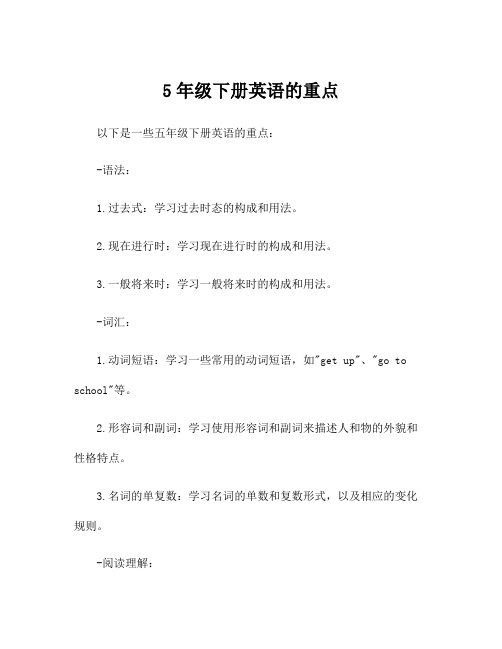
5年级下册英语的重点
以下是一些五年级下册英语的重点:
-语法:
1.过去式:学习过去时态的构成和用法。
2.现在进行时:学习现在进行时的构成和用法。
3.一般将来时:学习一般将来时的构成和用法。
-词汇:
1.动词短语:学习一些常用的动词短语,如"get up"、"go to school"等。
2.形容词和副词:学习使用形容词和副词来描述人和物的外貌和性格特点。
3.名词的单复数:学习名词的单数和复数形式,以及相应的变化规则。
-阅读理解:
1.短文理解:学习如何根据短文内容回答问题。
2.推理判断:学习通过对短文中信息的推理和判断,进行问题回答。
-口语表达:
1.日常交际用语:学习一些日常生活中常用的交际用语,如问候、请求、道谢等。
2.对话练习:通过对话练习,培养听说能力。
3.情景对话:学习在特定情境下进行对话交流。
-写作技巧:
1.句子结构:学习如何组织和连接句子,使文章流畅。
2.简单的写作练习:学习如何描述人、物、事件等,以及如何按
照时间顺序组织自己的写作。
这些只是五年级下册英语的一部分重点,具体的重点内容可能会
因不同教材和学校的教学要求而有所不同。
建议您根据教材和老师的
指导,仔细学习相关内容。
(完整版)人教版PEP五年级下册英语知识点复习总结
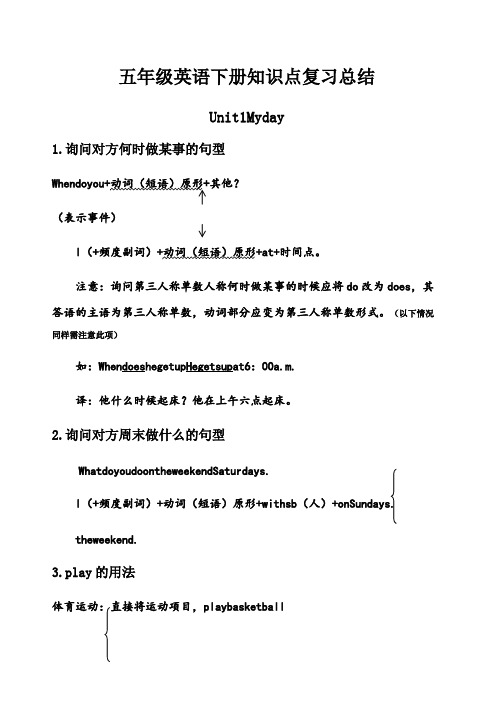
五年级英语下册知识点复习总结
Unit1Myday
1.询问对方何时做某事的句型
Whendoyou+动词(短语)原形+其他? (表示事件)
I(+频度副词)+动词(短语)原形+at+时间点。 注意:询问第三人称单数人称何时做某事的时候应将 do 改为 does,其 答语的主语为第三人称单数,动词部分应变为第三人称单数形式。(以下情况
同样需注意此项)
如:WhendoeshegetupHegetsupat6:00a.m. 译:他什么时候起床?他在上午六点起床。
2.询问对方周末做什么的句型
WhatdoyoudoontheweekendSaturdays. I(+频度副词)+动词(短语)原形+withsb(人)+onSundays. theweekend.
(2)在基数词后加 th:除去 first,second,third,其他基数词变序数词一般 直接在其后加 th。注意 five 与 twelve 要先把 ve 变 f,再加 th;eight 直接加 h;nine 去 e 再加 th。
(3)整十序数词以 ieth 结尾:整十位的序数词先将十位整数词尾的 y 变为 i, 再加 eth。如:twenty-twentieth。
The
注意:play-plays 因为 a 是元音 3)以 ch,sh,s,x 或 o 结尾的动词,在后面加-es; 例如 teach-teacheswash-washesdo-doesgo-goesfix-fixes
4)不规则的; 例如 have-has
5.by 的用法
五年级下册英语知识点整理
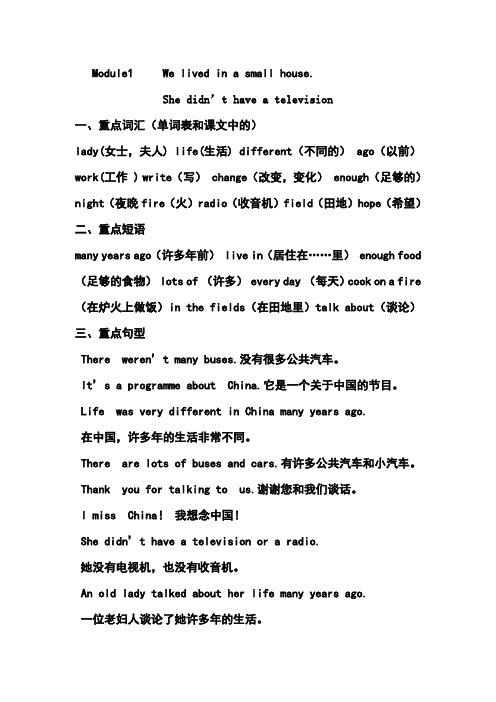
Module1 We lived in a small house.She didn’t have a television一、重点词汇(单词表和课文中的)lady(女士,夫人) life(生活) different(不同的) ago(以前)work(工作 ) write(写) change(改变,变化) enough(足够的)night(夜晚fire(火)radio(收音机)field(田地)hope(希望)二、重点短语many years ago(许多年前) live in(居住在……里) enough food (足够的食物) lots of (许多) every day (每天)cook on a fire (在炉火上做饭)in the fields(在田地里)talk about(谈论)三、重点句型There weren’t many buses.没有很多公共汽车。
It’s a programme about China.它是一个关于中国的节目。
Life was very different in China many years ago.在中国,许多年的生活非常不同。
There are lots of buses and cars.有许多公共汽车和小汽车。
Thank you for talking to us.谢谢您和我们谈话。
I miss China!我想念中国!She didn’t have a television or a radio.她没有电视机,也没有收音机。
An old lady talked about her life many years ago.一位老妇人谈论了她许多年的生活。
She couldn’t read or write. 她不会读也不会写。
四、自然拼读ai,ay /ei/ rain play al,au /ɔ: / walk autumn ar/ɑ:/ farmer party ar/ɔ:/ warm quarter五、背诵重点:课文第二部分六、语法点:过去式Module 2 She learnt English.Mr Li was a teacher.一、重点词汇learnt 学习(learn的过去式) foreign(外国的) studied 学习(study的过去式) language(语言) taught 教,讲授(teach 的过去式) wrote 写(write的过去式) dancer(舞蹈演员) hard (努力地)二、重点短语Foreign language(外语) learn English(学习英语) make a cake(做蛋糕)twenty years ago(二十年前)in his class(在他班里) a good pupil(一个好学生) an English teacher(一位英语老师) walk to school(步行去上学) by school bus(乘坐校车)三、重点句子Did she learn any foreign language她学过外语吗But he’s learning English now.但是他现在正在学习英语。
小学五年级英语下册《Unit5 Whose dog is it》知识点归纳
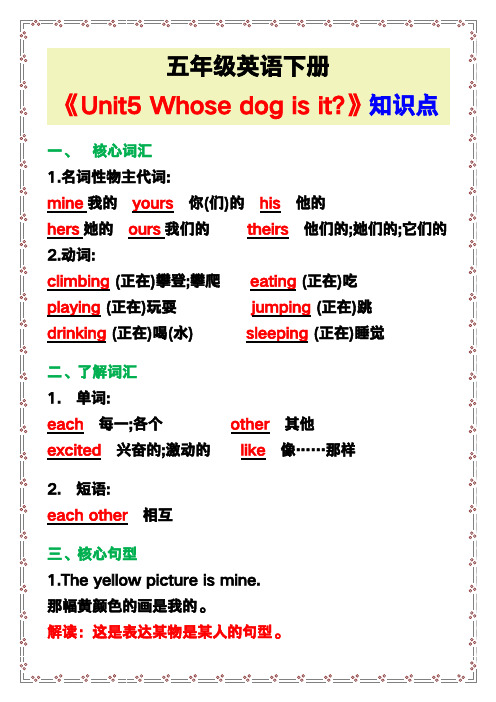
是张鹏的。
解读:当表示物品的从属关系时用名词性物主代词或名词所有格来表示。
4.—Is he drinking water?
他在喝水吗?
—No, he isn’t. He’s eating.
不,不是。他在吃东西。
解读:现在进行时的基本结构是be动词(am/is/are) +现在分词。
举一反三:This bag is hers.这个包是她的。
2.Are these all ours?
这些都是我们的画吗?
解读:这是询问某物是不是某人的一般疑问句。
举一反三:—Is the pencil yours?这是你的铅笔吗?
—Yes, it is.是的。
3.—Whose is it?
它是谁的?
四、了解句型
1.Robin is excited.罗宾非常兴奋。
解读:excited意思是“兴奋的”。一般用来修饰人。
2.I我在像熊一样跳舞。
解读:句中like是介词,意思是“像……那样”。
3.I like flying.我喜欢飞。
解读:like作动词,意思是“喜欢”,如like doing sth./like to do sth.喜欢做某事。
举一反三:—Is the tiger running?老虎在跑吗?
—No, it isn’t.不,不是。
人称代词表
名称
主格
宾格
形容词性
物主代词
名词性
物主代词
人
称代词
I(我)
me(我)
my(我的)
mine(我的)
you(你;你们)
you(你;你们)
your(你的;你们的)
人教版五年级英语下册全册知识点总结
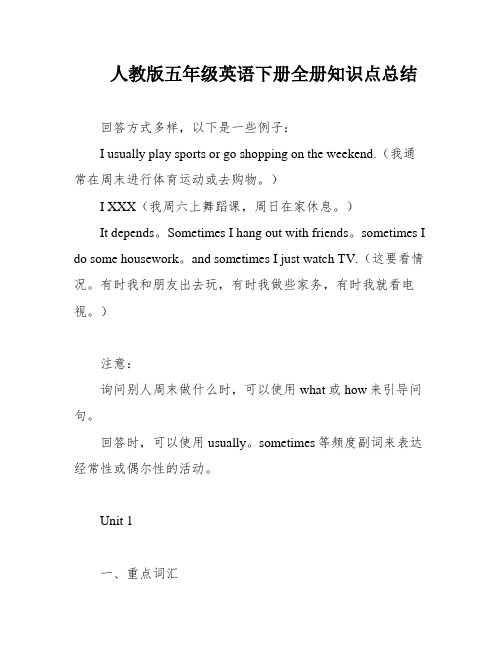
人教版五年级英语下册全册知识点总结回答方式多样,以下是一些例子:I usually play sports or go shopping on the weekend.(我通常在周末进行体育运动或去购物。
)I XXX(我周六上舞蹈课,周日在家休息。
)It depends。
Sometimes I hang out with friends。
sometimes I do some housework。
and sometimes I just watch TV.(这要看情况。
有时我和朋友出去玩,有时我做些家务,有时我就看电视。
)注意:询问别人周末做什么时,可以使用what或how来引导问句。
回答时,可以使用usually。
sometimes等频度副词来表达经常性或偶尔性的活动。
Unit 1一、重点词汇吃早餐:eat breakfast 上······课:have。
class进行体育运动:play sports做早操:do morning exercises 打扫我的房间:clean my room 去购物:go shopping舞蹈:dancing上午:a.m.通常地:usually二、其他日常活动起床:get up上床睡觉:go to bed活动,运动:exercise吃晚饭:eat XXX散步:go for a walk研究,上(课):XXX上舞蹈课:take a dancing class下午:p.m.吃午饭:eat XXX洗脸:XXX洗我的衣服:XXX看电视:watch TV打乒乓球:play ping-pong弹琵琶:play the pipa去游泳:go swimming去跑步:go running做作业:do homework练武术:do XXX踢足球:play football打篮球:play basketball三、语音cl→ [cl]:clean。
五年级英语下册期末复习重点
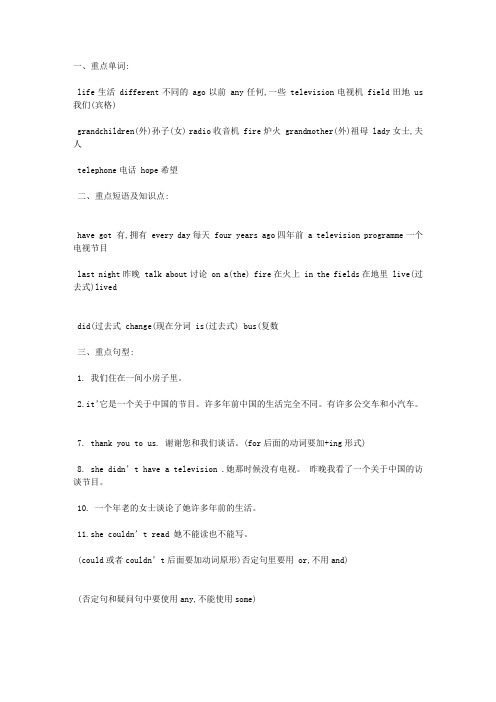
一、重点单词:life生活 different不同的 ago以前 any任何,一些 television电视机 field田地 us 我们(宾格)grandchildren(外)孙子(女) radio收音机 fire炉火 grandmother(外)祖母 lady女士,夫人telephone电话 hope希望二、重点短语及知识点:have got 有,拥有 every day每天 four years ago四年前 a television programme一个电视节目last night昨晚 talk about讨论 on a(the) fire在火上 in the fields在地里 live(过去式)liveddid(过去式 change(现在分词 is(过去式) bus(复数三、重点句型:1. 我们住在一间小房子里。
2.it’它是一个关于中国的节目。
许多年前中国的生活完全不同。
有许多公交车和小汽车。
7. thank you to us. 谢谢您和我们谈话。
(for后面的动词要加+ing形式)8. she didn’t have a television .她那时候没有电视。
昨晚我看了一个关于中国的访谈节目。
10. 一个年老的女士谈论了她许多年前的生活。
11.she couldn’t read 她不能读也不能写。
(could或者couldn’t后面要加动词原形)否定句里要用 or,不用and)(否定句和疑问句中要使用any,不能使用some)qiu jiagou.我在邱家沟。
(情景连线)第二模块一、重点单词:learnt(learn的过去式)学习 these这些 dancer舞蹈演员 class班级 study学习 hard 努力的retired退休的二、重点短语及知识点:dance( learn(过去式 learn(现在分词 make(过去式 teach(过去式) study(过去式 -go(三单 dance(名词)三、重点句型:因为她是个舞蹈演员。
小学五年级下册英语知识点,直接打印版

M1U1一、词形转换1.1ady(复数)ladies2.life(复数)lives3.different(对应词)same4.ago(近义词)before5.interviewer(动词原形)interview6.television(缩写)TV7.grandchildren(单数)grandchild8.night(对应词)day9.worker(动词原形)work10radio(复数)radios11couldn’t(完全形式)could not12write(过去式)wrote13.write(同音词)right二、短语1.两只漂亮的猫two beautiful cats2.在椅子上on the chair3.在英国in the UK4.和萨姆艾米一起with Sam and Amy5.一个关于中国的节目a programme about China6.非常不同very different7.许多年以前many years ago8.住在一所小房子里live in a small house9.足够的食物enough food10.许多公共汽车many buses11.住在一-所大房子里live in a big house12.许多食物lots of food13.每天every day14.为..谢谢你thank you for.15.想念中国miss China16.想念我的奶奶miss my grandma三、重点句子1.它是一一个关于中国的电视节目。
It’s a programme about China.2.在许多年前,中国的生活很不同。
Life was very different in China many years ago.3.我们住在一所小房子里。
We lived in a small house.4.没有任何的电视。
There weren’t any televisions.5.昨天晚上我和我的孙子孙女们一起看电Life was very different in China many years ago.M1U2一、词形转换1.talk(过去式)talked2.cook(过去式)cooked3.work(过去式worked4.can(过去式)could5.write(过去式)wrote6.write(同音词)right7.hope(过去式)hoped8.could(否定)couldn’t二、短语1.强壮的腿strong legs2.跳得非常远jump really far3.一个关于中国的电视节目a television programme about China4.昨天晚上last night5.-位老妇人an old lady6.在田地里in the fields7.在炉火上烹饪cook on a fire8.台收音机a radio9.想念我的奶奶miss my grandmaShe didn’t have a television.2.她不能读也不能写。
五年级英语下册复习知识点总结
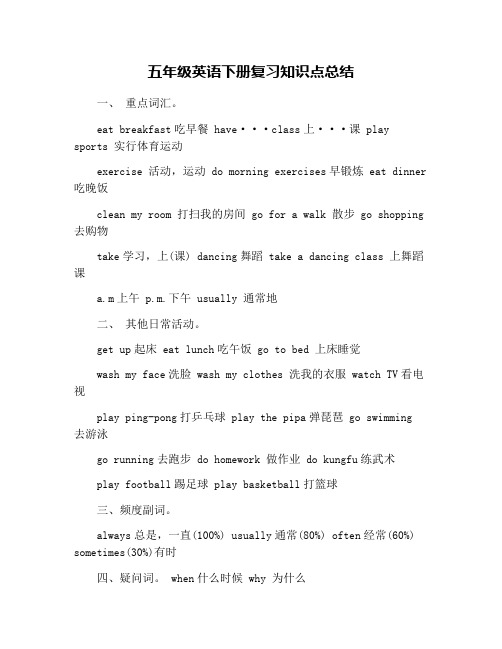
五年级英语下册复习知识点总结一、重点词汇。
eat breakfast吃早餐have···class上···课 play sports 实行体育运动exercise 活动,运动 do morning exercises早锻炼 eat dinner 吃晚饭clean my room 打扫我的房间 go for a walk 散步 go shopping 去购物take学习,上(课) dancing舞蹈 take a dancing class 上舞蹈课a.m上午 p.m.下午 usually 通常地二、其他日常活动。
get up起床 eat lunch吃午饭 go to bed 上床睡觉wash my face洗脸 wash my clothes 洗我的衣服 watch TV看电视play ping-pong打乒乓球 play the pipa弹琵琶 go swimming 去游泳go running去跑步 do homework 做作业 do kungfu练武术play football踢足球 play basketball打篮球三、频度副词。
always总是,一直(100%) usually通常(80%) often经常(60%) sometimes(30%)有时四、疑问词。
when什么时候 why 为什么五、重点句型。
1、询问别人什么时候做某事的句型及回答。
句型结构:问:When do you+动词短语原形+其他?(你/你们什么时候做某事?)答:I/we(+频度副词)+动词短语原形+at+具体时间(我/我们通常在几点做某事。
)例:问:When doyou go to bed?(你什么时候上床睡觉?)答:I go tobed at 9:00p.m (我晚上9点上床睡觉。
)注意:当主语是第三人称单数(he,she,it,单个人名或单数名词)时,助动词do要变成does,句型结构是:when does+主语(第三人称单数)+动词短语原形+其他?2、询问别人周末做什么的句型及回答。
五年级下册英语1到4单元知识点

五年级下册英语1到4单元知识点Unit 1: Holidays and festivals1. Vocabulary:- Holiday: A day when people do not go to work or school because of a special occasion.- Festival: A special time or event when people gather to celebrate something.- Celebrate: To do something special or enjoyable because of a special occasion.- Parade: A public celebration where people walk or drive along a route.- Costume: Special clothes that people wear for a party or festival.2. Grammar:- Present Simple Tense: Used to talk about habits, routines, facts, and general truths.- Adverbs of frequency: (Always, usually, often, sometimes, rarely, never) Used to show how often something happens.- Wh-questions: Questions that start with words like who, what, where, when, why, and how.3. Skills:- Reading: Understand different types of holidays and festivals around the world (e.g., Christmas, Thanksgiving, Chinese New Year).- Listening: Listen to conversations about holiday plans, traditions, and activities.- Speaking: Talk about favorite holidays and festivals and discuss how they are celebrated.- Writing: Write sentences and short paragraphs about holiday customs and traditions.Unit 2: Travelling1. Vocabulary:- Trip: A journey to a place and back again.- Journey: The act of traveling from one place to another.- Route: A way or course taken in getting from a starting point to a destination.- Vehicle: A machine that transports people or goods.- Sightseeing: To visit places of interest in a city or region.2. Grammar:- Present Continuous Tense: Used to talk about actions happening at the moment of speaking.- Imperatives: Commands or orders used to give instructions.- Prepositions of place: (In, on, at, by) Used to show the position or location of something.3. Skills:- Reading: Understand different types of transportation and travel destinations.- Listening: Listen to dialogues about booking tickets, planning trips, and giving directions.- Speaking: Describe travel experiences, ask for information, and give advice about traveling.- Writing: Write emails or postcards describing a recent trip, including details about accommodation, transportation, and sightseeing.Unit 3: Weather and seasons1. Vocabulary:- Weather: The condition of the atmosphere at a particular place and time.- Season: One of the four periods of the year (spring, summer, autumn, winter).- Temperature: How hot or cold the air is.- Forecast: A prediction of the weather in the future.- Sunny, cloudy, rainy, snowy: Different types of weather conditions.2. Grammar:- Present Continuous Tense: Used to talk about temporary actions happening now.- Comparative adjectives: (Bigger, smaller, hotter, colder) Used to compare two things.- Superlative adjectives: (The biggest, the smallest, the hottest, the coldest) Used to compare three or more things.3. Skills:- Reading: Understand the characteristics of each season and how they affect the weather.- Listening: Listen to weather forecasts, descriptions of seasons, and discussions about dressing for the weather.- Speaking: Talk about favorite seasons, describe typical weather in different seasons, and discuss clothing choices for different weather conditions.- Writing: Write short essays about favorite seasons, create weather forecasts, and describe seasonal activities and events.Unit 4: Animals and habitats1. Vocabulary:- Habitat: The natural home or environment of an animal, plant, or other organism.- Endangered: Threatened with extinction or destruction.- Species: A group of living organisms capable of interbreeding.- Predators: Animals that hunt and kill other animals for food.- Herbivores, carnivores, omnivores: Different types of animals based on their diet.2. Grammar:- Present Simple Tense: Used to talk about habits, routines, facts, and general truths.- Countable and uncountable nouns: Countable nouns can be counted (e.g., animals, trees), while uncountable nouns cannot be counted (e.g., water, air).- How much/many: Used to ask about the quantity of something (how much for uncountable nouns, how many for countable nouns).3. Skills:- Reading: Understand different types of animals and their habitats, including endangered species.- Listening: Listen to descriptions of animals, their behaviors, and their relationships with other animals.- Speaking: Talk about favorite animals, habitats, animal conservation, and animal-related activities.- Writing: Write reports about endangered animals, create posters about animal habitats, and describe animal behaviors and characteristics.。
五年级英语下册知识点汇总

五年级英语下册知识点汇总小学是我们整个学业生涯的根底,所以小朋友们一定要培养良好的学习习惯,今天为同学们特别提供了五年级英语下册知识点汇总,希望对大家的学习有所帮助!1. call v. 称作 What do you call it in English?2. like v. 喜欢sth. I like English very much.like to do sth. I like reading very much, but I don’t like to read now.doing sth.3. let’s + 动词原形Let’s (=let us) make animals. let sb. do sth. 让某人做某事4. want v. 想,想要want sth. I want a piece of paper.to do sth. I want to watch TV.5. 情态动词情态动词很简单,没有人称数之变,动词原形后边站,can表能力 may许可 should应该 would愿 must必须,否认needn’t换 have to不得不表客观1. 概念:一般现在时表示经常的、习惯性的动作或存在的状态。
2. 构成:一般现在时的构成主要有两种形式:(1)be型:句子的谓语动词只有be(am,is或are):a.肯定句中,只出现be,如:I am a student.我是一名学生。
b.否认句中,要在be后面加not,如:She isn't a teacher.她不是教师。
c.一般疑问句,要将be放在句子开头(注意句首字母大写),句尾用问号,答语用Yes,主语+be.或No,主语 + be + not.如:—Are you ready?—你准备好了吗?—Yes,I am.—是的,我准备好了。
(—No,I'm not.—不,我没准备好。
)(2)实义动词型:句中的谓语动词为实义动词(也叫行为动词):a.肯定句中,只出现实义动词,如:I get up in the morning.我早晨起床。
小学五年级英语下册知识点总结

M10U1-------重点词组:1. this weekend 这个周末2. I don’t know 我不知道3. I think so 我也这样认为4. all right 没事,没问题5. make a list of things to do 列一个要做事情的清单6. safe trip 旅行安全,一路顺风7. feel nervous 感觉到紧张重点句型:1.Where are you going this weekend, Sam?萨姆你这个周末要去哪里?2.When are you going to get up ?你将要什么时候起床?3.Mum ,what did you say to me ?妈妈,你刚刚对我说了什么?4.Are you ready for your trip tomorrow ?你准备好你明天的旅行了吗?5.I’m going to meet you in New York .我将要在纽约接你。
6.You can make a list of things to do .你可以列一个要做事情的清单7.What are you going to take ? 你将要带什么东西?8.When are you going to the airport?你什么时候去机场?9.Who’s going to the airport with you ?谁将要跟你一起去?U2-------重点词组:1. arrive there 到那2. at the airport 在机场3. take a yellow taxi 乘坐一辆黄色出租车4. lots of tall building 许多高大的建筑物5. find out 找到、发现6. a big exciting word 一个令人激动的大世界7. by plane 乘飞机8. have a party 举办一个聚会9. sing a song 唱一首歌10. play a game 玩个游戏11. make a plan 制作一个计划12. at the zoo 在动物园里13. take lots of photos 照了许多照片重点句型:1.I’m in New York now. 我现在在纽约。
- 1、下载文档前请自行甄别文档内容的完整性,平台不提供额外的编辑、内容补充、找答案等附加服务。
- 2、"仅部分预览"的文档,不可在线预览部分如存在完整性等问题,可反馈申请退款(可完整预览的文档不适用该条件!)。
- 3、如文档侵犯您的权益,请联系客服反馈,我们会尽快为您处理(人工客服工作时间:9:00-18:30)。
Unit 1 This is my day知识点四会句子:When do you eat dinner?你几点钟做晚饭?I usually eat dinner at 7:00 in the evening?.我通常七点钟吃晚饭。
When do you get up?你几点起床?I usually get up at 12:00 noon.我通常在12点起床.What do you do on the weekend?你周末干什么?Usually I watch TV and go shopping.Sometimes I visit my grandparents.我通常看电视和购物,有时我还去看望祖父母.I often play football. Sometimes I go hiking.我经常踢足球,有时去远足四会单词及词组:do morning exercises 做早操eat breakfast吃早饭 get up起床have English class 上英语课 play sports 做运动 eat dinner吃晚饭climb mountains 爬山 go shopping去购物 go hiking去远足visit grandparents 看望祖父母 play the piano 弹钢琴when 在……时候 evening晚上 noon中午 weekend周末 usually通常 often 经常 sometimes有时小作文1:范文:My DayHello ! My name is Chen Lingling .I am a student .I go to school from Mondayto Fridays .Tuesday is my favourite day .On Tuesday ,I get up at 7:00 in the morning .I eat breakfast at 8:00 I do morning exercises at 10:05 .I eat lunch at 12:00. We have P. E. class at 2:30. I go home at 5:00. I eat dinner at 5:30. And I go to bed at 9:00. This is my favourite day .小作文2:范文:My WeekendHello! My name is Chen Lingling . I often do homework and read books on Saturdays. Sometimes I watch TV .Saturday is fun for me .Sunday is my favourite day .On Sundays ,I often play computer games and watch TV . Sometimes I go hiking .Sunday is sweet for me .This is my weekend .What about your weekend? Can you tell me, please?补充:活动次数比较:often 〉usually 〉sometimes容易写错的单词:exercises,climb,piano,usually,visit grandparents生疏的单词:question问题,tell告诉,timetable时间表,next下一个,weather report 天气预报,either也(用于否定句的末尾) ]介词后跟表示时间的词语时,表示在某年、某月、某个季节,某个时候(在上午,在下午,在晚上)用in;表示在某一天,在星期几、几月几号用on,在具体的几点几分用at.常见错误:1.在中午应为at noon,很多学生写成in the noon.2.姓名的英文写法:三个字的姓名如周瑞成应这样写:Zhou Ruicheng而不是Zhou Rui Cheng3.我喜欢…….比如我喜欢做运动应为I like playing sports或者 I like to play sports,而不应该是I like play sports4.时刻几点几分前用at,如 I eat breakfast at 7:00.或者而不应该是I eat breakfast is 7:00.5.一般现在时态适用与于这篇小作文,比如I swim at 4:00,而不应该是I am swimming at 4:00这样的现在进行时。
6.容易写错的单词usually(错写成uauslly),get up(错写成gut up),7.My Day 是个标题,所以单词首字母要大写,在文章中要恢复小写,如This is my day.8.回家是go home而不是go to homeUnit 2 what’s your favourite season?知识点四会句子:Which season do you like best?你最喜欢哪个季节?I like winter best.我最喜欢冬天。
Summer is good, but fall is my favourite season.夏天不错,但秋天是我最喜欢的季节。
Why do you like summer?你喜欢夏天吗?Because I can swim in the lake.因为我能在湖中游泳。
Why do you like winter?你为什么喜欢冬天?Because I can sleep a long time.因为我能长长地睡上一觉。
四会单词和词组:summer 夏天fall秋天 winter冬天 season 季节 which 哪一个 why为什么 because 因为 best 最好 swim游泳 sleep 睡觉 fly kites放风筝 skate滑冰 plant trees 种树 make a snowman堆雪人笔记:What’s your favourite season? =Which season do you like best?你最喜欢的季节是什么?My favourite season is summer.=I like summer best.我最喜欢夏天。
秋天fall是美国的说法,autumn是英国的说法go up north往北方去the Great Wall长城1、同义词:autumn—fall第三人称单数形式:say—says ask—asks come—comes对应词:wake up—sleep go to bed—get up2、play with 玩雪,play in the snow在雪中玩 . 如果在横线后面有the ,则选择in , 如果在横线后面没有the , 则选择 with.3、like后面不能直接跟动词。
如果需要跟动词或动词性词组时,则需在like后面加to. 如果不加to. 就要把后面的动词变成相应的动名词形式. 如:I like to swim ===I like swimming.4、当表示某地某个季节的天气情况时,要把季节放在前面,地点放在后面。
其结构为:What’s the weather like in 季节in 地点?小作文1范文:SeasonsThere are four seasons in a year. They are spring, summer, fall, winter. In spring, it’windy and warm. I can plant trees. In summer, it’s sunny and hot.I can swim. In fall, it’s windy and cool. I can go hiking. In winter, it’s windy and cold. I can make a snowman.小作文2: I like …(选择一篇)I like springIn a year ,I like spring best .Because spring is beautiful ,The sky is blue .The air is fresh .Spring is green with flowers and songs .I often plant trees and plant flowers . Sometimes I can wear my dress and fly kites with my brother .Spring is very beautiful .I like itI like winterHello! My name is Chen Lingling .I am a happy girl . My birthday is in winter .In winter,the weather is cold and snowy .The road and the house are white .I can skate and make a snowman with my brothers . like winter, because my birthday is in winter.unit3 My birthday 知识点四会句子:When is your birthday?你的生日在什么时候?It’s is in May.我的生日在五月。
My birthday is in June. Uncle Bill’s birthday is in June, too.我的生日在六月.比尔叔叔的生日也在六月。
Is her birthday in June? Yes.她的生日在六月吗?是的。
What’s the date?几月几日?June 9th .六月九日四会单词January (Jan.) 一月February (Feb.) 二月March (Mar.)三月April 四月May五月 June六月 July七月 August(Aug.)八月 September(Sept.)九月 October(Oct.)十月 November( Nov.) 十一月December(Dec.) 十二月birthday生日笔记:读一读序数词1st ,2nd ,3rd ,4th ,5th ,8th ,9th ,12th ,20th (注意1右上角为st,2右上角为nd,3右上角为rd,从第四开始,右上角都写th)Birthday Chart生日表in December在12月份。
